| Reviews & Columns |
|
Reviews DVD TV on DVD Blu-ray 4K UHD International DVDs In Theaters Reviews by Studio Video Games Features Collector Series DVDs Easter Egg Database Interviews DVD Talk Radio Feature Articles Columns Anime Talk DVD Savant Horror DVDs The M.O.D. Squad Art House HD Talk Silent DVD
|
DVD Talk Forum |
|
|
| Resources |
|
DVD Price Search Customer Service #'s RCE Info Links |
|
Columns
|
|
|
Maggie Smith at the BBC (The Merchant of Venice, The Millionairess, Bed Among the Lentils, Suddenly, Last Summer)
BBC Video has released Maggie Smith at the BBC, a decidedly mixed-bag, three-disc compilation of four television dramas starring the incomparable Maggie Smith. Programs include the 1972 Play of the Month production of William Shakespeare's The Merchant of Venice; The Millionairess, the G.B. Shaw play that was also a 1972 Play of the Month offering; Bed Among the Lentils, a playlet from the 1988 miniseries Talking Heads, and Suddenly, Last Summer, the 1993 reworking of the Tennessee Williams shocker. There are a handful of intriguing extras that will no doubt please fans of the mercurial, brilliant Smith, but truth be told, this collection isn't the best representation of this particular artist's work.
I'm sure like most American viewers (of a certain age), when one thinks of Maggie Smith, Jean Brodie, her brilliantly satirical creation that won her an Academy Award, first comes to mind. So overwhelming and totally successful was her portrayal that it became difficult not to look for bits and pieces of Brodie in subsequent performances (or to mine earlier ones for hints of what was to come). Certainly her career on the British and American stages is at least (and probably more so) as accomplished as her film work, so it's unfair to view Brodie as the be-all, end-all of what Smith has to offer. Personally, my favorite Smith performance was a supporting bit she did for Neil Simon's California Suite, a rather unsuccessful ensemble piece that featured an absolute jewel of a duel between Smith and Michael Caine as a married couple facing a crisis of identity (confident Caine is gay, and vulnerable Smith dearly wishes he wasn't). It's a virtual compendium of the various Smith delights, and nicely encapsulates what she was capable of doing on screen.
Unfortunately for Maggie Smith at the BBC, several of the vehicles gathered here don't capitalize well on her strengths. She's always magnetic and compelling (even when she finds little to do with her character, as with Portia in The Merchant of Venice), but the plays presented here, with the possible exception of The Millionairess and Bed Among the Lentils (and they're by no means perfect), are flawed productions that mute Smith's abilities. Let's look at the individual productions.
DISC ONE
THE MERCHANT OF VENICE
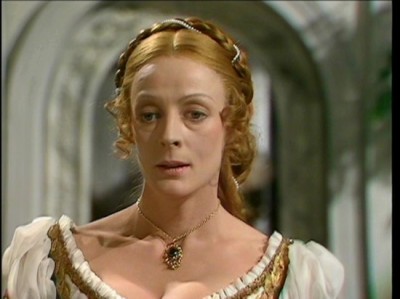
Shakespeare's "comedy" features Maggie Smith as Portia, a Belmonte heiress who suffers under a cruel limbo imposed by her father's will. Portia cannot marry unless her suitor picks the correct box containing her portrait (one silver, one gold, one lead); to help the potential husband, a riddle has been inscribed on each box to guide (or trick) the future groom. Her suitor - and it can be anyone who so chooses to try, regardless of whether or not Portia loves them - has an equally strict stipulation for trying their luck with the marriage lottery; if they choose incorrectly, they must swear to live out their lives as bachelors.
Bassanio (Christopher Gable), a young Venetian who once met Portia and fell instantly in love with her, desperately wants to try and win her hand, but he fails to have the money necessary to travel north. Going to his good friend Antonio (Charles Gray), Bassanio asks the merchant for the loan of 3,000 ducats - a request the wealthy Antonio cannot immediately grant because his money is tied up in his shipping fleet. Urging Bassanio to go into the marketplace and see what his good name will scrounge up in credit, Antonio is presented with a bond by Shylock (Frank Finlay), a Jewish moneylender who harbors deep feelings of hatred and revenge against Antonio, who has repeatedly belittled and humiliated the Jew, based on his race and religion. If Antonio agrees to take Shylock's money, he has three months to repay it - otherwise, he will repay Shylock with a pound of his flesh. Antonio, despite Bassanio's urging not to agree to the bond, accepts the terms.
Word soon comes, though, that spells doom for Antonio: his ships have floundered at sea, and he can't repay the loan. Shylock sues in court to get his pound of flesh (despite pleas of mercy from everyone, including the judge). Meanwhile, Bassanio is successful in winning Portia's hand - just in time to borrow money from her to bail out Antonio. Yet Bassanio refuses even double the payback value of the loan - he wants his pound of flesh. It takes Portia, disguised as a male attorney, to trick the court into not only invalidating Shylock's contract, but punishing his cruelty in pursuing Antonio's death. The lovers celebrate the return of Antonio, while Shylock's world is destroyed.
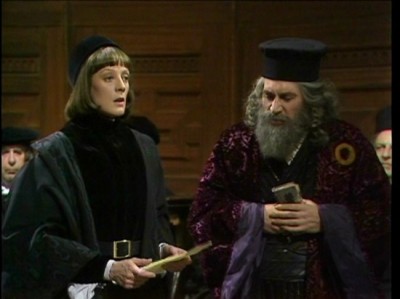
Directed by Play of the Month's long-time producer, Cedric Messina, The Merchant of Venice comes off as a rather colorless production, marred by indifferent acting and a refusal to cast Shylock in any kind of discernable position, good or bad. Termed one of Shakespeare's "problem plays" for its transitional variances between drama and comedy, The Merchant of Venice's success must always come from how Shylock is portrayed. Whether he's a villain, a victim, a tormentor or tormented, or a complex amalgamation of all of them, what Shylock cannot be is vague, undefined, and ineffectual if the play is to have any weight during its dramatic scenes. And unfortunately, whether it's Messina's direction of Frank Finlay or Finlay himself, this The Merchant of Venice's Shylock imparts very little power or presence to the proceedings. With inexpressive eyes, Finlay hides behind his makeup and costuming and fails to light a fire under one of the most hotly debated characters in theatre. Perhaps it was fear of just that kind of debate (the anti-Semitic aspects of the play, rightly or wrongly, have been debated since the play debuted) that kept Finlay and Messina at bay. Regardless of the reasons, his Shylock is perhaps the least memorable I've seen on stage or on film.
And things aren't much better for Smith, who seems miscast, as well, for Portia. Certainly Smith's extensive comedy theatre chops would seem ideal for the final scenes of Portia's successful con of Bassanio's ring and her taunting and teasing when he can't produce it for her. And Smith's at times strangely androgynous sexuality certainly lends itself well to her scenes as the attorney in the court (she looks quite right in the male costuming). Unfortunately, her opening moments as Portia come off as weary and tentative, with none of the spark and energy we expect from Smith. It's a desultory performance, correct on the words but bearing none of the guarded wit that's there if she chose to pick it up. Inertia infects most of the cast of The Merchant of Venice, with the normally entertaining Charles Gray essaying a fuzzy, flustered Antonio and Gable disappearing into the woodwork as a vapid Bassanio. Only Bunny May, in an inspired turn as a Cockney Lancelot, seems to be in on the joke.
DISC TWO
THE MILLIONAIRESS
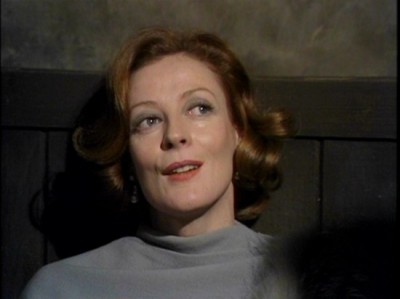
Based on the 1936 play of the same name by George Bernard Shaw (and perhaps best known as a loosely adapted 1960 feature film starring Sophia Loren and Peter Sellers), The Millionairess shoots for political satire masquerading as romantic farce as it tells the story of Epifania Fitzfassenden (Maggie Smith), a fabulously wealthy woman who rages against her unhappy marriage. Arriving at attorney Julius Sagamore's (Peter Barkworth) office in near hysteria (which amuses Julius no end), Epifania demands that her will be drawn up so she may promptly commit suicide. Detesting her philandering, abusive husband Alastair (James Villiers), Epifania seeks to escape a marriage ordained by her rich father. When she was young, her father stipulated that before she marry anyone, that she give her suitor 150 pounds; if he couldn't turn it into 50,000 pounds within six months, she shouldn't marry him. Unfortunately for Epifania, professional boxer Alastair was able to turn that profit, and she married him - to her regret.
After Alastair and his girlfriend Patricia Smith (Priscilla Morgan) show up at Sagamore's office, as well, along with Epifania's own paramour, ineffectual layabout Adrian Blenderbland (Charles Gray), she escapes with Blenderbland to have lunch at a small, grotty little roadside café, where she viciously assaults Adrian when he dares to insult Epifania's beloved father. Arriving on the scene is Dr. Ahmed el Kabir (Tom Baker), a dedicated Egyptian doctor who works with poor Moroccan refugees. Contemptuous of Epifania's shamming about her "injuries" (she has none), he is none the less taken with her beauty and her contradictions concerning wealth and love. She mentions her father's test of suitability for marriage, as does he about a similar test his mother impressed on him, for the suitability of a wife: give a woman 35 shillings and see if she can live by her own means for six months. He accepts her challenge (even though he admits he'll lose), and she accepts his - whereupon she quickly turns the 35 shillings into more millions within the six months. The lovers meet again, and decide both have satisfied the terms of the contest.
Fast-paced despite a 100-minute running time, The Millionairess is perfectly suited to the unique talents of Maggie Smith, even if the political moralizing of the final act, combined with the somewhat sentimental take on marriage make for a sticky union. The first act of The Millionairess is Maggie Smith in her prime, raging and preening at the same time as she deliciously spits out the Shavian insults to the amused Barkworth. Throughout the play, the ping-ponging Shavian word play is deftly knocked about by Smith, who clearly relishes the chance to exercise her quick wits and flash-powder, pyrotechnical flourishes. Barkworth, a marvelous supporting player always seen in the background of British films (who also had a solid theatrical career), is every bit as engaging as the sanguine Sagamore, so much so that I missed their repartee throughout the rest of the film.
Charles Gray, playing the type of role he often was stuck with, is amusing as always (looking like the Cheshire Cat when he sticks that square jaw out of his and slits up his sardonic eyes), while Tom Baker (famous for playing Doctor Who) does at times bring Dr. el Kabir off more like his Rasputin turn in Nicholas and Alexandria rather than as a typically Shavian male jouster. Directed by William Slater, The Millionairess does takes some missteps when it tries to "open up" the play, particularly an ill-advised photo montage sequence (set to supposedly "madcap" jazz) that's intended to bridge the time between Epifania's acceptance of Dr. Ahmed's challenge, and her completion of the task (I've seen these photo montages in other BBC productions from this period, and I suspect they were considered convenient cost-cutter solutions for dramatic problems). But overall, it's an agreeably feisty romp with Smith at the top of her game, even though admittedly it's not top-flight Shaw (nobody who's ever been married buys Shaw's defense of the institution at the end of the play).
BED AMONG THE LENTILS
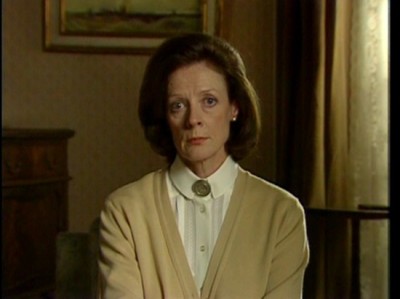
A one woman monologue featuring Smith as the alcoholic wife of a vicar, Bed Among the Lentils was one of six filmed monologues from writer and director Alan Bennett's 1987 miniseries, Talking Heads. Smith plays Susan, the repressed, resigned, deeply sad wife of an Anglican vicar who drinks to escape her feelings of being left behind by life, and ignored by her husband. Broken up into three small acts, the first has Susan detailing the stultifyingly dull life she leads, along with the meaningless obligations that go along with being a vicar's wife. The second, more comical in nature than the first and last, details a seemingly humorous flower-arranging session with other parishioners, where Susan accidentally falls at the altar. It's amusing until one later realizes she was probably drunk when she fell. As well, her husband's abandonment of her after her fall, spurs her to eventually travel to Leeds, where she allows an Asian grocer she befriended, to sleep with her. The final act has Susan discussing the liberating affair, and its sad aftermath, as well as her acknowledgment of her drinking problem.
Bitterly anti-religious, Bed Among the Lentils is one of those mesmerizing little monologues that work when the actor is mesmerizing - which Smith is indeed here. Playing against her usually high-octane, almost imperious theatrical style, Smith is subdued to the point of catatonia in the opening scenes, creating an indelible impression of regret and sadness that's truly poignant. This is her show all the way; she has no one to ping her trademark snappy, arch lines off, nor does she have the luxury of a live audience to gauge her delivery (a tremendous help with a narrowed, solitary piece like this). It's a remarkable performance, full of nuance.
That being said, what Smith has to say here doesn't turn out to be nearly as interesting as how she says it. Bennett's sour condemnation of religion is hardly new or startling, and with his arguments being so decidedly, unrelentingly one-sided, it soon begins to sound like a rant, rather than considered criticism. As compelling as Smith is in delivering the inexorable litany of complaints she has in her marriage, these kinds of monologues (which always seem to steer towards one-sided whining and complaining) always give me the perverse desire to immediately hear the other side of the story from the complained-about spouse or institution - but they're never heard from. No quarter is ever given to the "other side," nor sympathy for that matter, in Bed Among the Lentils, so its potential message and lessons are somewhat muted by the polemics.
DISC THREE
SUDDENLY, LAST SUMMER
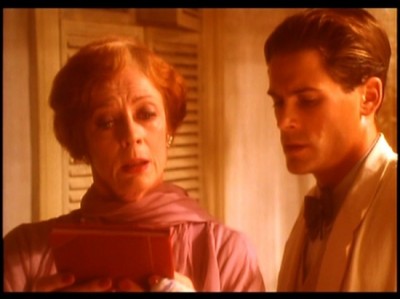
Sticking closely to Tennessee Williams' original one-act play of the same name (the 1959 feature film with Katherine Hepburn, Elizabeth Taylor and Montgomery Clift, expanded the plot and added new characters), Suddenly, Last Summer tells the story of Violet Venable (Maggie Smith), an eccentric, wealthy Southern matron who is not-so-subtly bribing young Dr. Cukrowicz (Rob Lowe) into performing a lobotomy on relative Catharine Holly (Natasha Richardson). Her reason? She is terrified that Catharine, who has been confined to a mental hospital (brought about by Violet bribing Catharine's mother), will disclose the true nature of the death of her son, Sebastian. Traveling together in Europe the summer before, Sebastian died a horrible death, the facts of which Catharine knows all too well - and which Violet wants buried forever, preferring her fantasy of who and what Sebastian really was, to survive. Dr. Cukrowicz ("Sugar" in Polish), is naturally suspicious of Violet's rationale, and requests that Catharine be brought to Violet's mansion to hear her story.
I remember quite well seeing this 1993 version of Williams' play on PBS; I remember it because it was such a distinct let-down from director Joseph L. Mankiewicz's 1959 production, of which I'm a great admirer. Although director Richard Eyre stays much closer to the original Williams production, that isn't necessarily a good thing. Williams' one-act play was designed essentially as two long monologues, and this adaptation feels far more theatrical (and therefore, stagebound) rather than cinematic (as with the Mankiewicz version). Claustrophobically staged on cheap, tiny sets, with dim, inconsistent lighting, this Suddenly, Last Summer looks small-time - and sounds small-time, as well.
Smith's interpretation of Violet suffers as much from her somewhat detached air (reportedly, she was extremely ill during the filming, which shows), as from the overwhelming influence of Katherine Hepburn's earlier indelible portrait. The memory of Hepburn's turn, who took this monster of a character to such odd, almost celestial heights of the macabre, can't be forgotten as Smith's rather more down-to-earth and dour portrayal struggles to even get the Southern accent right. Critically, we never really get a sense of monstrous, violent evil from Violet, as we should; we never feel like she's really willing to make sure Catharine has a lobotomy to keep her quiet - something that silkily perverse Hepburn effortlessly achieved (I think that role may be one of her finest).
As for Smith's co-stars, they suffer by earlier comparisons, as well. For Richardson's Catharine character to be believable as a procurer for Sebastian's homosexual lovers, she has to project some kind of sexuality - very little of which is on display here. Far too meek and demure in her approach, again, like Smith, the British actress has trouble with the accent, burbling out what appears to be a concoction of thick molasses and extensive oral surgery rather than honeyed Southern sultriness. It's a little girl's performance of a character that demands a woman - which, as anyone who has seen the film version knows, Elizabeth Taylor most certainly fit the bill. As for Lowe, I've only seen one performance of his that was competent...and it's not this one (he was used quite well in 1988's excellent Masquerade). With his absent, handsome face and unexpressive dolls eyes, there may never have been a dearer, more earnest purveyor of vacuity in films than Lowe. It doesn't help that his part isn't nearly as involved as Clift's was for the earlier film version, but that still doesn't excuse his general air of hapless, do-gooder ineptitude. With all three leads either miscast or misguided in their interpretations, Suddenly, Last Summer quite suddenly becomes a total misfire.
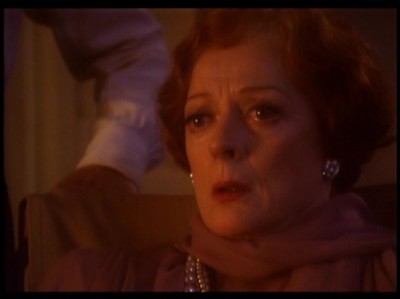
The DVD:
The Video:
The full-screen, 1.33:1 video transfers vary in quality due to the various ages of the source material, but overall, with the exception of Suddenly, Last Summer, the transfers are relatively clean and sharp. The Merchant of Venice, shot on video, has its flare-outs and hot spots, along with sometimes faded color. The Millionairess, shot on both video and film, looks quite nice here, with an agreeably bright, sharp transfer (although grain is noticeable in the filmed segments). Bed Among the Lentils, shot on video, is sharp (if a little dark), but Suddenly, Last Summer is a mess, with a smeary pink hue, video noise, and a soft, fuzzy picture.
The Audio:
The English 2.0 stereo audio mix is entirely adequate for this type of release, with all dialogue heard cleanly. English subtitles are available - another plus.
The Extras:
On disc one, there's an interview with Clive Goodwin, from a series called Acting in the '60s (undated, but I think 1970), which features Maggie Smith discussing her theatre background extensively. Good friend Kenneth Williams shows up (marvelous in the Carry On films), while Kenneth Tynan narrates the opening of the show, running down the list of Smith's achievements. The interview runs 44:58. On disc two, there's a two hour radio play, William Wycherley's The Country Wife, starring Smith, Jonathyn Pryce, John Duttine, John Moffat, Bernard Hepton, Marriet Walter, and Barbara Jefford. As well, there's a clip of Smith's 1973 appearance on Michael "Parky" Parkinson chat show, which runs 15:34 (and again, Kenneth Williams shows up). And on disc three, a new documentary, Maggie Smith: A Portrait features biographer Michael Covenay, directors Richard Eyre and Alan Bennett, and actor Simon Callow discussing Smith's career. It runs 28:26.
Final Thoughts:
While the four televised theatre pieces gathered together in Maggie Smith at the BBC aren't the best representation of her work, two of her performances are excellent here, and fans of the actress (myself included) will not likely get a chance to see these rarities anywhere else. I recommend Maggie Smith at the BBC for diehard fans of the actress, but anyone else might try a rental first.
Paul Mavis is an internationally published film and television historian, a member of the Online Film Critics Society, and the author of The Espionage Filmography.


|
| Popular Reviews |
| Sponsored Links |
|
|
| Sponsored Links |
|
|
| Release List | Reviews | Shop | Newsletter | Forum | DVD Giveaways | Blu-Ray | Advertise |
|
Copyright 2024 DVDTalk.com All Rights Reserved. Legal Info, Privacy Policy, Terms of Use,
Manage Preferences,
Your Privacy Choices | |||||||












